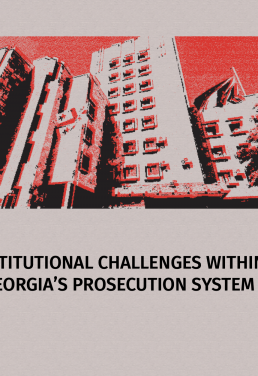საერთო ცხელი ხაზი +995 577 07 05 63


In a democratic and rule-of-law-based state, the Prosecutor’s Office plays a crucial role in ensuring the impartial administration of criminal justice grounded in human rights. For this institution to fully carry out its functions in alignment with the rule of law, its sound institutional design is of paramount importance. Likewise, the accurate analysis of the prosecutorial system is essential for identifying existing problems. Today, several fundamental models of the prosecutorial institution exist in developed democracies, with their design heavily dependent on the political and legal systems of the respective countries. Nevertheless, in all cases, the functioning of this institution is based on the complementary principles of independence and democratic accountability.
In Georgia, the prosecutorial system is currently centralized and characterized by an internal hierarchy. However, it should be noted that over the past two decades, multiple legislative reforms - some even at the constitutional level - have been undertaken regarding the functioning and structure of the Prosecutor’s Office. These reforms have led to several substantial changes in the institutional status and design. Ultimately, the Prosecutor’s Office was granted the status of an independent constitutional body. Nonetheless, legislative and institutional reforms alone have failed to ensure the system’s actual independence, resembling the unfortunate outcomes of the justice system’s years-long yet superficial institutional reform process. Instead of fostering the development of law enforcement and justice systems, the ruling authorities have, for years, demonstrated a vested interest in maintaining and expanding control over the Prosecutor’s Office. As a result, systemic reform and the creation of effective mechanisms for ensuring prosecutorial independence have never been the genuine objectives of the legislative changes.
Recently, amid an acute political and societal crisis in Georgia, political and partisan influence over the Prosecutor’s Office - similar to other state and democratic institutions - has been steadily increasing. This trend is particularly evident in politically sensitive criminal cases, where fundamental rights such as liberty, freedom of expression, and others are blatantly violated through the actions of individual prosecutors and the application of criminal law mechanisms. Therefore, in the event of potential future democratic change, the need for fundamental reform of both the justice system as a whole and the Prosecutor’s Office in particular must be firmly placed on the agenda. Such reform, in turn, must be based on a careful observation and critical analysis of the current state of affairs.
The present document - offering a concise and critical overview of the main institutional challenges facing Georgia’s prosecutorial system today - is an attempt in that direction. It critically examines the concentration of powers in the key bodies of the prosecutorial system, namely the General Prosecutor’s Office and the Prosecutorial Council, and devotes a separate section to analyzing the flaws related to the system’s democratic accountability.
The institutional and legal analysis of the prosecutorial system reveals the following:
The website accessibility instruction